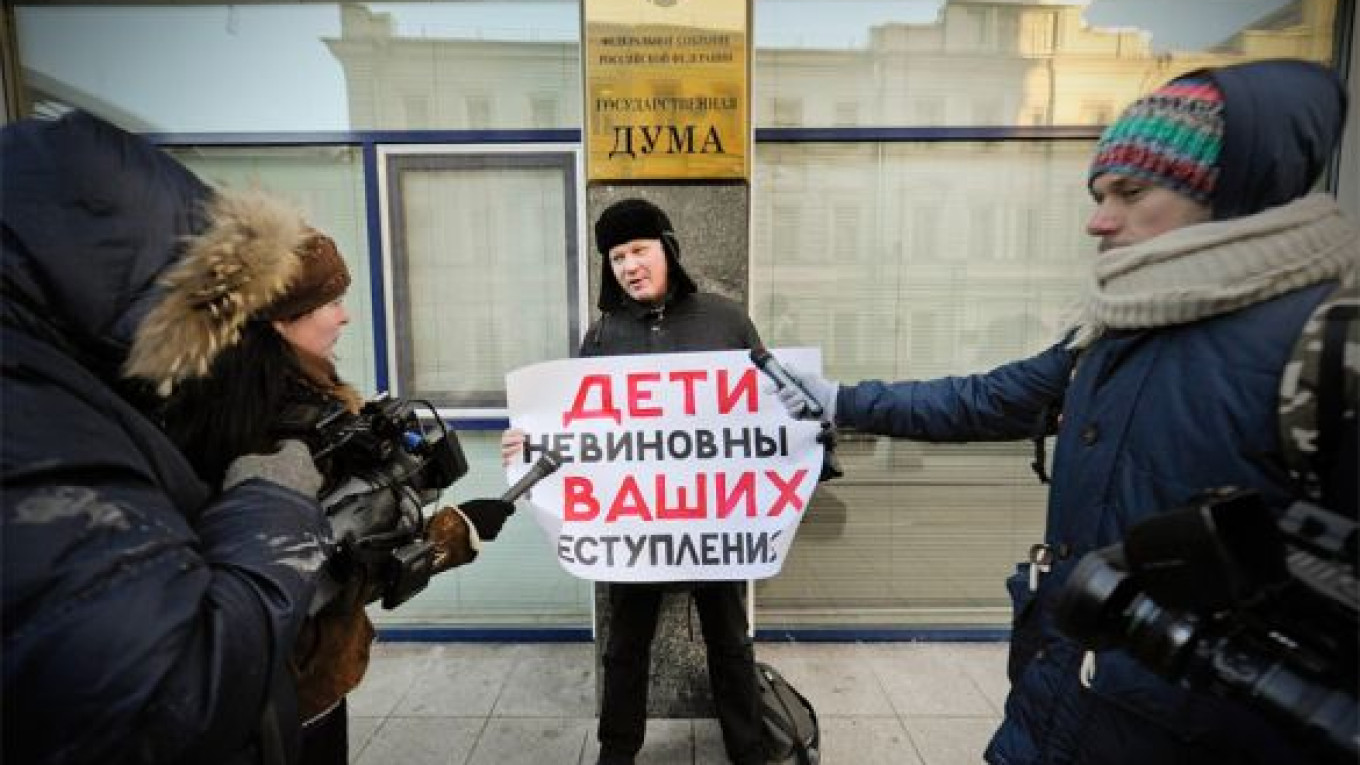Despite intense criticism from the public and senior officials, State Duma deputies on Wednesday overwhelmingly approved measures that would ban U.S. adoptions and further tighten restrictions on U.S. funding of nongovernmental organizations.
In doing so, deputies significantly sharpened legislation meant as retaliation for the United States’ Magnitsky Act, which calls for sanctions against Russians suspected of human rights abuses and was signed into law Friday.
The Russian bill, which passed its second of three readings Wednesday, would outlaw adoptions of Russian children by U.S. citizens and ban nongovernmental organizations involved in “political activities” from accepting U.S. funds or being staffed by American citizens.
The legislation already includes financial and travel sanctions against Americans deemed to have mistreated Russians, and on Wednesday deputies extended this measure to include all foreigners.
But the fate of the adoption ban, which quickly encountered loud public opposition and calls for restraint from senior officials after it was proposed Monday, remains unclear, as President Vladimir Putin has yet to voice his stance.
Only four deputies, all from A Just Russia, voted against the amended “Dima Yakovlev Act,” with 400 of the chamber’s 450 members voting for it.
But the country’s top leaders — Putin, Prime Minister Dmitry Medvedev and Federation Council Speaker Valentina Matviyenko — stopped short of supporting the amended legislation, which could mean that it lacks the support needed to become law.
Putin’s spokesman said the executive branch had a more “restrained” approach than deputies, but Putin understood their “emotional” reaction to the Magnitsky Act, Interfax reported.
Matviyenko similarly said deputies should not let emotions overwhelm reason.
The adoption ban has sparked rare public infighting between government officials.
On Monday, a deputy with the ruling United Russia party said Education and Science Minister Dmitry Livanov was “unfit for his job” after Livanov criticized the ban.
Many expected Medvedev to attempt to smooth over differences between senior members of his Cabinet, including Livanov and Foreign Minister Sergei Lavrov, who oppose the adoption ban, and deputies from United Russia, which Medvedev leads.
But in a highly anticipated speech to party members, the prime minister explicitly refused to offer his opinion on the ban.
Instead, Medvedev told more than 400 United Russia leaders from around the country that the party needed to create a program to encourage domestic adoptions.
“Foreign adoptions are a sign of our own indifference, and this is very sad,” he said, adding that the Russian government had the financial ability to help Russian parents adopt.
Medvedev’s lack of clarity on the United Russia-proposed bill, which the State Duma subsequently approved in its second reading, resulted in lawmakers offering their own interpretations on what to do.
“No signal was sent, so we are going to vote with our own hearts,” Vladimir Vasilyev, head of United Russia’s faction in the Duma, told reporters after the meeting.
By contrast, Duma Deputy Speaker Sergei Neverov said the legislation on banning adoptions by Americans would be put into force on Jan. 1.?
Meanwhile, ordinary citizens continued to speak out against the ban.
More than 79,000 people had signed a petition against amendments to the bill on Novaya Gazeta’s website as of 7 p.m. Wednesday.
Putin has said that petitions that receive 100,000 signatures or more must be reviewed by officials.
And despite temperatures that hovered around minus 15 degrees Celsius, more than a hundred people began picketing outside the Duma at 9 a.m. They held children’s drawings and placards condemning the adoption ban.
A woman wearing a Santa Claus hat held a sign that said, “Children as a strategic weapon. Are you kidding?” Another sign read, “How many children with disabilities have deputies adopted?”
About 30 picketers were detained, police said, Interfax reported.
Opponents also took to Twitter, where #scoundrelsbill was at times the most popular hashtag among users of the microblogging service in Russia.
Orphans’ advocates have unanimously condemned the proposed ban on U.S. adoptions, 956 of which took place last year.
The legislation would annul a new bilateral adoption agreement aimed at improving monitoring and reducing instances of abuse, which went into effect on Nov. 1.
Staff writer Alexander Bratersky contributed reporting.
Related articles:
A Message from The Moscow Times:
Dear readers,
We are facing unprecedented challenges. Russia's Prosecutor General's Office has designated The Moscow Times as an "undesirable" organization, criminalizing our work and putting our staff at risk of prosecution. This follows our earlier unjust labeling as a "foreign agent."
These actions are direct attempts to silence independent journalism in Russia. The authorities claim our work "discredits the decisions of the Russian leadership." We see things differently: we strive to provide accurate, unbiased reporting on Russia.
We, the journalists of The Moscow Times, refuse to be silenced. But to continue our work, we need your help.
Your support, no matter how small, makes a world of difference. If you can, please support us monthly starting from just $2. It's quick to set up, and every contribution makes a significant impact.
By supporting The Moscow Times, you're defending open, independent journalism in the face of repression. Thank you for standing with us.
Remind me later.


